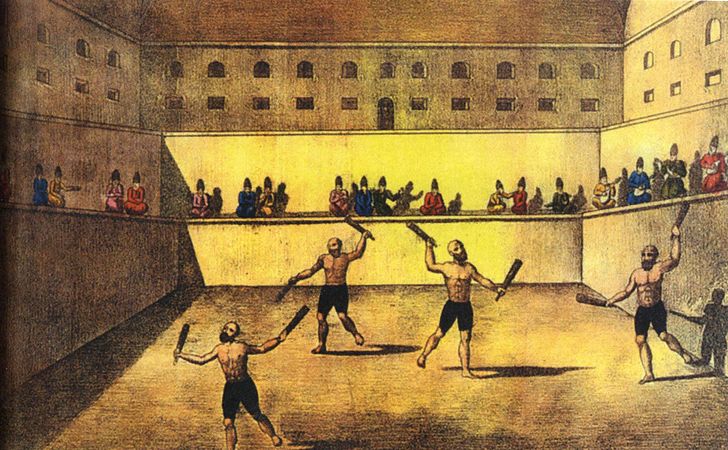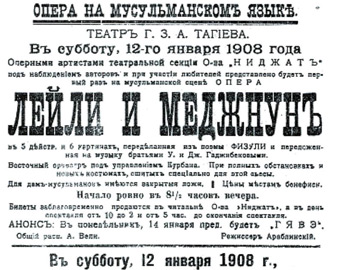THE ESTABLISHMENT AND DEVELOPMENT OF AZERBAIJANI THEATER
The Establishment and Development of Azerbaijani Theater Azerbaijani Theatre are closely connected with the activity, life, festivities, wedding traditions, and outlook of the people. Ancient traditional ceremonies, such as "Sayachy", "Novruz", and "Gevsech" encompass theatrical elements such as choruses, dances, various archetypical characters, and dialogues in dramatic plays. The most important moment of the ceremony of Novruz, in the game "Kosa-Kosa", is the pattern of the theatrical plays. The game is characterized by a plot, dramatic moments, and actors in masks who wear special clothes. The episodes "Khan-Khan", "Dancing of Mutribs" ("mutrib" means "a boy in woman's dress"), "The Competition Between the Bride and Mother-In-Law" and others performed at wedding ceremonies reveal the importance of elements of games and performance. The elements of a stage theatre are also strong in a widespread ceremony "Yugh", at the meetings of Ozans' and Ashugs, in the scenes of "Zorxana", and in rope-dancers' shows.
elements such as choruses, dances, various archetypical characters, and dialogues in dramatic plays. The most important moment of the ceremony of Novruz, in the game "Kosa-Kosa", is the pattern of the theatrical plays. The game is characterized by a plot, dramatic moments, and actors in masks who wear special clothes. The episodes "Khan-Khan", "Dancing of Mutribs" ("mutrib" means "a boy in woman's dress"), "The Competition Between the Bride and Mother-In-Law" and others performed at wedding ceremonies reveal the importance of elements of games and performance. The elements of a stage theatre are also strong in a widespread ceremony "Yugh", at the meetings of Ozans' and Ashugs, in the scenes of "Zorxana", and in rope-dancers' shows.
Folklore theatre played a great role in the development of the professional theatre of Azerbaijan.
The history of Azerbaijani theatre dates back to the staging of "Lenkeran khanin veziri" (Vezir of Lenkoran Khanate ) and "Hadji Gara" by M.F.Akhundov in March and April of 1873. These were performed by pupils of the school of realism with the close participation of N. Vezirov and A. Adygozelov (Gorani) and were the stimulus for the establishment of the national theatre.
Leading intellectuals of Azerbaijan and teachers later graduating from the Gory Seminary staged various performances in Shusha, Nakhichevan and other cities (it is interesting to note that they simultaneously played a number of roles in each performance). Leading teachers and intellectuals, led by U.Melik-Hagnazarov arranged shows in clubs and in Khandemirov's theatre in Shusha during summer vacations. They mainly staged comedies by M.F.Akhundov ("Khyrs-quldurbasan", "Musyo Jordan ve dervish Mesteli shah").
Creations by M.F. Akhundov were also performed. The comedies, for example, were staged in Azeri starting in 1876. The most prominent among the leading intellectuals were N. Vezirov, the author of a number of comedies and vaudevilles, B. Badalbeyov, A. Velibeyov, F. Kocherli, H. Sarydjalinski, Mukhtar Muradov, I. Shefibeyov, the famous singer Djabbar Qaryaghdyoghlu (Shusha), M. Sidgi, Dj. Mamedguluzade's brother Mirza Alekper, playwright E. Sultanov (Nakhichevan), R. Efendiyev (Nukha), etc. From 1870-1880 the amateurs working in different cities of Azerbaijan gradually gathered around the workers of the Baku theatre. Therefore, Baku theatre livened by the late 1880s, in which to the establishment of a permanent theatre team. In 1887, the theatre team in Baku was led by H.Mahmudbekov, S.M.Ganizade and N.Veliyev. They strengthened this team and transformed it into a troupe that started its career as the staff of an independent theatre in 1888.
H.Zerdabi created the first professional theatre troupe "The first Muslim theatrical troupe" in Baku in 1896. The union of actors was established for the first time in Baku in 1897. The repertoire of Azerbaijani theatre included the plays of national dramatists as M.F.Akhundov, N.Vezirov, H.Vezirov, N.Natimanov, A.Haqverdiyev, Dj. Mamedguluzade and others and was also enriched by creations of Russian (N.V.Gogol, I.S.Turgenev, L.N.Tolstoy and Western European classics (V.Shakespeare, F.Shiller, H.Heyne, Y.B.Molyer). From its very establishment Azerbaijani theatre adhered to the ideas of democracy and enlightenment. Along with the comedies of M.F.Akhundov, such plays as "Musibeti Fakhreddin" ("Misfortune of Fakhraddin"), "Avoiding rain, caught in a rainfall by N.Vezirov, "The ruining house", "An unhappy young", "Agha Mukhamed Shah Gadjar" by A, Hagverdiyev, "Nadanlig" ("Ignorance"), "Nadir Shah" by N.Narimanov exposed the traditions of feudalism, despotism and tyranny of capitalism.
 Due to the lack of means for renting an appropriate establishment, the performances were shown in a salon "Granvio" of the trade passage. The play "Ignorance" by N.Narimanov was staged there in 1906.
Due to the lack of means for renting an appropriate establishment, the performances were shown in a salon "Granvio" of the trade passage. The play "Ignorance" by N.Narimanov was staged there in 1906.
The staging of a masterpiece by U.Hadjibeyov "Leyli and Medjnun" -the first creation of the national opera in January 1908 (by a new calendar-January 25), laid the foundation of professional musical theatre of Azerbaijan. Within the first year of the establishment of the theatre U'Hadjibeyov's musical comedies created in 1908-1913 "Leyli and Medjnun", "Sheikh Senan", ": No matter this or that", "Arshin Mal Alan" dominated the repertoire of the theatre. The following years were marked by enrichment of theatrical repertoire with such creations of Z. Hadjibeyov (musical comedies "Ashug Garib", "Young at the age of fifty", "The Married Bachelor"), M.Magomayev ("Shah Ismayil", "M.M.Kazinovsky (musical comedy "Vurhavur"), M.Dj.Amirov (opera "Seyfalmulk"). A new cultural and educational society "Shafa" and a theatrical department under this society were established in 1910. Yet the theatrical trope of "Shafa" was weaker compared with "Nidjat". However, the actors of Nidjat's trope gradually transferred to Shafa". D.Bunyadzade, poet Samed Mansur, actors Dj. Zeynalov, A.M. Sherifzade took an active part in the activity of the society and from time to time actors from Nidjat as H.Arablinski, M.A.Aliyev, S.Ruhulla, H.Sarabski were invited to take part in the theatrical shows. The troupe of Shafa not only arranged performances but also dealt with cultural and educational issues related to the theatre. The troupe celebrated the 25th jubilee of Dj. Zeynalov's creative activity in 1911, the 100th jubilee of M.F.Akhundov in 1911, the fortieth anniversary of N.Vezirov's theatrical activity. Shafa was characterized not only by performing its shows in towns and villages of Azerbaijan but also by arranging tours to other countries (South Caucasus, Central Asia, North Caucasus, in the cities of Iran, Astrakhan, Kazan, etc). On the whole, both Nidjat and Shafa made a great contribution to the strengthening of the organization and creative activity of the Azerbaijani theatre.
The staging of the comedy "Oluler" ("The deceased") by Dj. Mamedguluzade in 1916 proved the maturity of the Azerbaijani theatre. The play that stood against ignorance and superstitions, lie and tyranny was a great success. The union of Muslim Artists was founded in Baku in 1917. A.M.Sharifzade was elected the chair of the union. The union, uniting all theatrical troupes, produced performances based on friendship. However, this union survived only up to 1918. The entrepreneurs of Mayilov theatre did not give the actors an opportunity to appear on the stage. Most of the actors went on tours. Only the troupe of U. Hadjibeyov and Z. Hadjibeyov brothers operated permanently.
The troupe involved the actors of theatre, opera and operetta. The theatre of Azerbaijan which reflected the leading, democratic ideas played a great role in the cultural development of people. However, at that period the theatre did not reach the high level of scene ethics.



